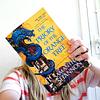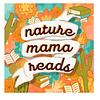Take a photo of a barcode or cover
I hardly know what to say about this book. It was exactly what I needed when I needed it. Richard Rohr has such a perceptive and clear view of the human experience and how God wants to breathe new life into us. It is breathtaking. In this volume Rohr looks at the twelve steps through the lens of Jesus’ teachings. He provides critique of the Church is its varied manifestations and also shows how we can grow and heal as a community and individually. I highly recommend this book and I cannot wait to read another of Richard Rohr’s books.
This was an amazing book - a great way to look at Christian spirituality and the 12 steps. It's an amazing paradigm shift from how we look at our spiritual lives today. The way Rohr delves into the 12 steps leaves the reader with a lasting impression. I borrowed this book from a priest friend on Kindle - but I think I'm going to have to purchase a physical copy for myself to re-read it. Highly recommended.
I didn't enjoy this as much as other Rohr books, but, of course, there are gems to be found in anything he writes. As someone who did not know the 12 steps in advance, and following on audio, I was a bit lost at times with some of the thread of what he was discussing. I think I would have enjoyed it more if I already had a foundation of understanding in them.
I now read the book itself and find that much easier to follow than the audioversion, which was a live presentation to a group. This book is not afraid to evaluate how the 12 steps can help all of us, and to critically evaluate religion in our lives and how it can be both helpful and not very helpful. I love his candor and the concept that underlies the whole book, those who struggle with addiction have their struggles very visible to others, but all of us have spiritual struggles that the 12 steps can help us with.
We are all spiritually powerless, however, and it’s not just those physically addicted to a substance, which is why I address this book to everyone. Alcoholics just have their powerlessness visible for all to see. The rest of us disguise it in different ways, and overcompensate for our more hidden and subtle addictions and attachments, especially our addiction to our way of thinking.
We all take our own pattern of thinking as normative, logical, and surely true, even when it does not fully compute. We keep doing the same thing over and over again, even if it is not working for us.
To finally surrender ourselves to healing, we have to have three spaces opened up within us—and all at the same time: our opinionated head, our closed-down heart, and our defensive and defended body. That is the work of spirituality—and it is work.
Religion is lived by people who are afraid of hell. Spirituality is lived by people who have been through hell.
Religion either produces the very best people or the very worst.
To keep the heart space open, we need several things. First, we almost all need some healing in regard to our carried hurts from the past. The church’s somewhat strange word for this was “original sin,” which we were told was not something we were personally guilty of but was something that was done to us and passed from generation to generation. No point in blaming anybody. If it was not one thing, it was another. Then he recommends the Enneagram. Finally, I think the heart space is often opened by ‘right brain’ activities such as music, art, dance, nature, fasting, poetry, games, life-affirming sexuality, and, of course, the art of relationship itself.
Your shadow self is not your evil self. It is just the part of you that you do not want to see, your unacceptable self by reason of nature, nurture and choice. That bit of chosen blindness, or what AA calls denial, is what allows us to do evil and cruel things—without recognizing them as evil or cruel.
I now read the book itself and find that much easier to follow than the audioversion, which was a live presentation to a group. This book is not afraid to evaluate how the 12 steps can help all of us, and to critically evaluate religion in our lives and how it can be both helpful and not very helpful. I love his candor and the concept that underlies the whole book, those who struggle with addiction have their struggles very visible to others, but all of us have spiritual struggles that the 12 steps can help us with.
We are all spiritually powerless, however, and it’s not just those physically addicted to a substance, which is why I address this book to everyone. Alcoholics just have their powerlessness visible for all to see. The rest of us disguise it in different ways, and overcompensate for our more hidden and subtle addictions and attachments, especially our addiction to our way of thinking.
We all take our own pattern of thinking as normative, logical, and surely true, even when it does not fully compute. We keep doing the same thing over and over again, even if it is not working for us.
To finally surrender ourselves to healing, we have to have three spaces opened up within us—and all at the same time: our opinionated head, our closed-down heart, and our defensive and defended body. That is the work of spirituality—and it is work.
Religion is lived by people who are afraid of hell. Spirituality is lived by people who have been through hell.
Religion either produces the very best people or the very worst.
To keep the heart space open, we need several things. First, we almost all need some healing in regard to our carried hurts from the past. The church’s somewhat strange word for this was “original sin,” which we were told was not something we were personally guilty of but was something that was done to us and passed from generation to generation. No point in blaming anybody. If it was not one thing, it was another. Then he recommends the Enneagram. Finally, I think the heart space is often opened by ‘right brain’ activities such as music, art, dance, nature, fasting, poetry, games, life-affirming sexuality, and, of course, the art of relationship itself.
Your shadow self is not your evil self. It is just the part of you that you do not want to see, your unacceptable self by reason of nature, nurture and choice. That bit of chosen blindness, or what AA calls denial, is what allows us to do evil and cruel things—without recognizing them as evil or cruel.
challenging
emotional
funny
hopeful
informative
inspiring
mysterious
reflective
fast-paced
I lost a lot of ink in this book - shoulda just wrote a note in the front - “Almost every line is worth underlining.”)
I’ve heard how the 12 steps of AA treat not solely addicts but the human condition. And especially in reading this book, I’d agree. I learned so much, gained beautiful insight, and found myself reconnecting to myself (my true self) - an important journey.
I’ve heard how the 12 steps of AA treat not solely addicts but the human condition. And especially in reading this book, I’d agree. I learned so much, gained beautiful insight, and found myself reconnecting to myself (my true self) - an important journey.
...this is quite possibly the most important/impactful/transformative book I've ever read.
There were times when I nearly threw the book across the room, because I was so freaked out and so overwhelmed by the Grace that was being presented. A few weeks ago I would've thought that was hyperbole- it sounds ridiculous, I know...but that's how it was.
That being said, I'm not sure if this is for everyone. My extreme reaction to the book kind of makes me feel like it was just super, super, super relevant to a very specific time/situation in my life. Like...I'm sure it's a fantastic book, but I'd be interested to see it through a different lens. What would I have thought/felt if I read it a year ago? Or maybe if I read it a year from now. In both cases I can imagine it being somewhat underwhelming, just in different senses of the word- maybe it would sound silly and meaningless before and maybe a bit obvious a year from now. I don't know. All I know is that for me, right now, this book was INSANE and so incredibly valuable.
It was a totally wild ride that had me holding my breath and yelping and laughing at the pure absurdity of Grace and crying and slamming the cover shut and just sitting there with my hand over my mouth saying "...oh my gosh..." for a few minutes.
There were times when I nearly threw the book across the room, because I was so freaked out and so overwhelmed by the Grace that was being presented. A few weeks ago I would've thought that was hyperbole- it sounds ridiculous, I know...but that's how it was.
That being said, I'm not sure if this is for everyone. My extreme reaction to the book kind of makes me feel like it was just super, super, super relevant to a very specific time/situation in my life. Like...I'm sure it's a fantastic book, but I'd be interested to see it through a different lens. What would I have thought/felt if I read it a year ago? Or maybe if I read it a year from now. In both cases I can imagine it being somewhat underwhelming, just in different senses of the word- maybe it would sound silly and meaningless before and maybe a bit obvious a year from now. I don't know. All I know is that for me, right now, this book was INSANE and so incredibly valuable.
It was a totally wild ride that had me holding my breath and yelping and laughing at the pure absurdity of Grace and crying and slamming the cover shut and just sitting there with my hand over my mouth saying "...oh my gosh..." for a few minutes.
Greta way to relate the twelve steps to Christian spirituality.
informative
slow-paced
hopeful
inspiring
reflective





